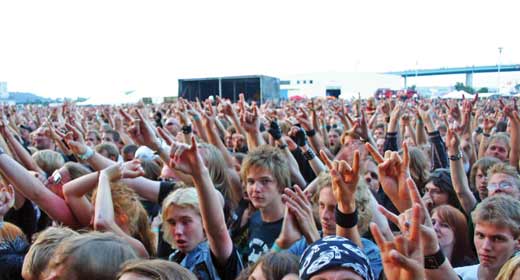
James Kendall: It’s really hard to define what makes a good festival. It’s more than just a good line up. Reading, I remember, used to have a really good line up but I never considered going there rather than Glastonbury.
Jason Clark: Yeah, I think that’s true. The line up is really important but maybe one of the things is knowing exactly what you are, having your own identity as a festival. Glastonbury has got a very clear idea of what it has, and the Big Chill – Bestival has an incredibly strong identity. With Loop what we very much tried to do was set ourselves up as an event that showcases things that we believed were good and were going to do well in the future. That’s why we were programming things like Foals and Metronomy last year.
JK: The Great Escape do a similar thing, where they almost spend more time talking about bands that played last year rather than this. That’s quite a confident way of booking and marketing a festival.
JC: That’s very much the sort of thing that we’re trying to achieve. I think the Great Escape is a really good example of an event that has got better year on year, as it’s grown into knowing what it is. When it first arrived it called itself a ‘British South By South West’. I went there and I’m not sure how much it lived up to that, but this year I thought it was fantastic, a great showcase.
JK: And now the May festivals are joined by loads in August.
JC: It’s great. Brighton has lacked in the live festival circuit and it’s amazing that you can see four major events with Pride one week, then At Home By The Sea, then us then Beachdown. It’s probably the best line-up of live music you’ll see in Brighton for a long while. And they’re all very different. I’m really interested in At Home By The Sea – very strong local performers, and some very good leftfield bands. Chrome Hoof is a great addition to anybody’s bill. And with Beachdown catering for a slightly older audience, I hope that all of us can be successful.
JK: A festival really needs a great band, but a good band isn’t necessarily a good festival band.
JC: You need to have the songs to start with, but you also need to have the interaction with the crowd. Personality and charisma are very important. I’ve seen a lot of bands who do have the songs but don’t put it over live, don’t engage the crowd to go with them.
JK: I think you’ve got to realise that if you’re playing a festival you’re not playing necessarily to your fans so you have to do a little bit more. Either play a greatest hits sort of set or…
JC: I think that’s different from festival to festival. At Glastonbury a lot of people will be going there expecting the greatest hits show. At Bestival a lot of the time you’ll see artists throw a curve ball. There isn’t really the requirement for everybody to play the famous songs all the way through.
JK: Talking of great festival performances I went to the muddy Glastonbury where Radiohead played their ‘best live set ever’. But I’d gone home already and I watched it on a 14″ black and white TV, tucked under a duvet in bed. That was the best way to see it, I think.
JC: I was there and it was an amazing set, but the best live act I saw at Glastonbury was Pavement and they blew me away. I was still having a Britpop hangover and buying British stuff, so to bring someone in who isn’t a fan is really good.
JK: One of the most memorable festival performances for me was seeing Al Green on my own at Glastonbury after being up for the whole festival. I was ruined until he came on but halfway through I was pledging my soul to Jesus with him. You’ve got to let yourself be dragged into a festival.
JC: I remember you at a festival saying you’d had a religious experience at Mogwai. Maybe your soul is easily taken.
JK: I’m a soul slut.

